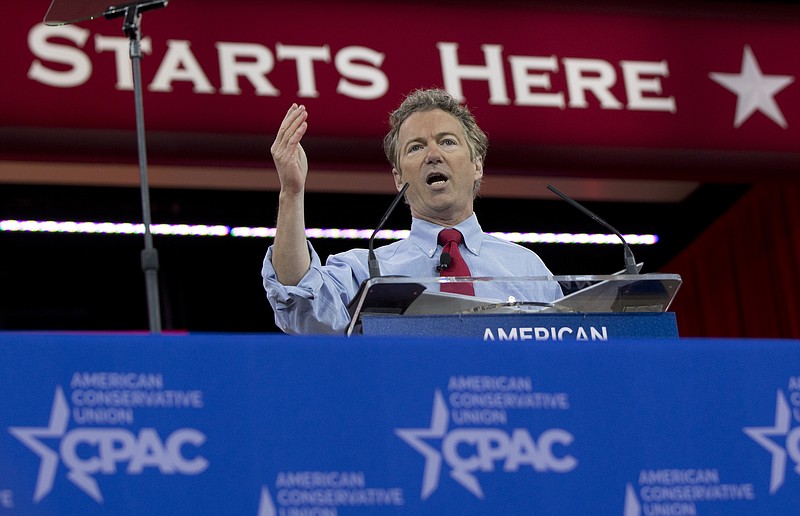A third straight presidential straw poll win at the annual Conservative Political Action Conference(CPAC) gathering might be expected to give such a candidate a sense of inevitability for the 2016 Republican nomination.
But U.S. Sen. Rand Paul, R-Ky., has no such inevitability and probably never will as long as he maintains the stance that he's not an isolationist but believes the country should eliminate all foreign aid.
The Bluegrass State's junior senator won 25.7 percent of the vote over the weekend at the conference in Oxon Hill, Md., a year before the presidential race will be in full swing.
Paul's total was down from the 31 percent he drew last year and nearly the same as the 25 percent he pulled in 2013.
Conservatives are only a portion of all GOP voters -- an important portion if the party wants to regain the White House -- but the larger Republican electorate recognizes that a foreign policy in which the U.S. is just a bystander is a no-go in today's world.
Neither that electorate nor any potential candidates are clamoring for an all-out war footing with the Islamic State extremists who have swallowed parts of Syria and Iraq and would like to eliminate Israel, but nearly all realize that further engagement in some way with the terrorist group is necessary.
President Barack Obama's missteps in the region -- not leaving ground troops in Iraq at the end of the war there and not following through with enforcement of his "red line" declaration against Syrian President Bashar al-Assad's alleged use of chemical weapons, among others -- have pointed up the folly of disinterest in the Middle East.
The question for the GOP electorate will be which runner-up to Paul is the right candidate to take on Hillary Clinton, the likely Democratic nominee next year.
Increasingly, the former first lady, U.S. senator and secretary of state looks beatable, with her dubious foreign policy record and questions about fundraising policies at the Clinton Foundation, but Republicans have yet to coalesce around a candidate as they did with George W. Bush in the open election in 2000.
The party's donor and establishment class favors Jeb Bush, the former Florida governor, but he is no favorite of conservatives with his support of immigration reform and all out backing of Common Core education standards.
Those are already strikes one and two against him with the right wing of the party. Strike three, fair or not, may be his close relationship to two other presidents named Bush in the past 25 years.
That relationship also would dog him in a general election, too, where Democrats and Big Media would spare no expense in tying him to any policy deemed by the left to be failed by either his father or brother, the 41st and 43rd presidents.
Behind Paul, CPAC voters -- many of whom are more libertarian than the party in general -- gave a second-place finish to Wisconsin Gov. Scott Walker, third to Texas Sen. Ted Cruz, fourth to neurosurgeon Dr. Ben Carson and fifth to Bush.
Importantly, though, younger CPAC attendees told Politico what the entire party must understand -- that electability is preferable to ideological purity.
"I will sacrifice complete agreement for the reality of being a winner," one said.
In presidential politics, to borrow the exhortation of mid-20th century UCLA football coach Red Sanders (later attributed to Green Bay Packers football coach Vince Lombardi), winning isn't everything, it's the only thing.
Obama is reaping that now with judicial appointments, executive orders and other congressional work-arounds.
Donor gatherings through 2015 and primaries in early 2016 will winnow the candidate field, but a potential southern Super Tuesday on March 1, 2016, could clear the decks for Bush, a southern Bush alternative (Paul, Cruz, Florida Sen. Marco Rubio, Texas Gov. Rick Perry, former Louisiana Gov. Bobby Jindal or former Arkansas Gov. Mike Huckabee) and a non-southern candidate (Walker more likely than fading New Jersey Gov. Chris Christie or former Pennsylvania Sen. Rick Santorum).
At that point, Republicans will need to unite around the candidate best able to articulate a mature domestic and global vision for the country and, more importantly, to win in 2016.
